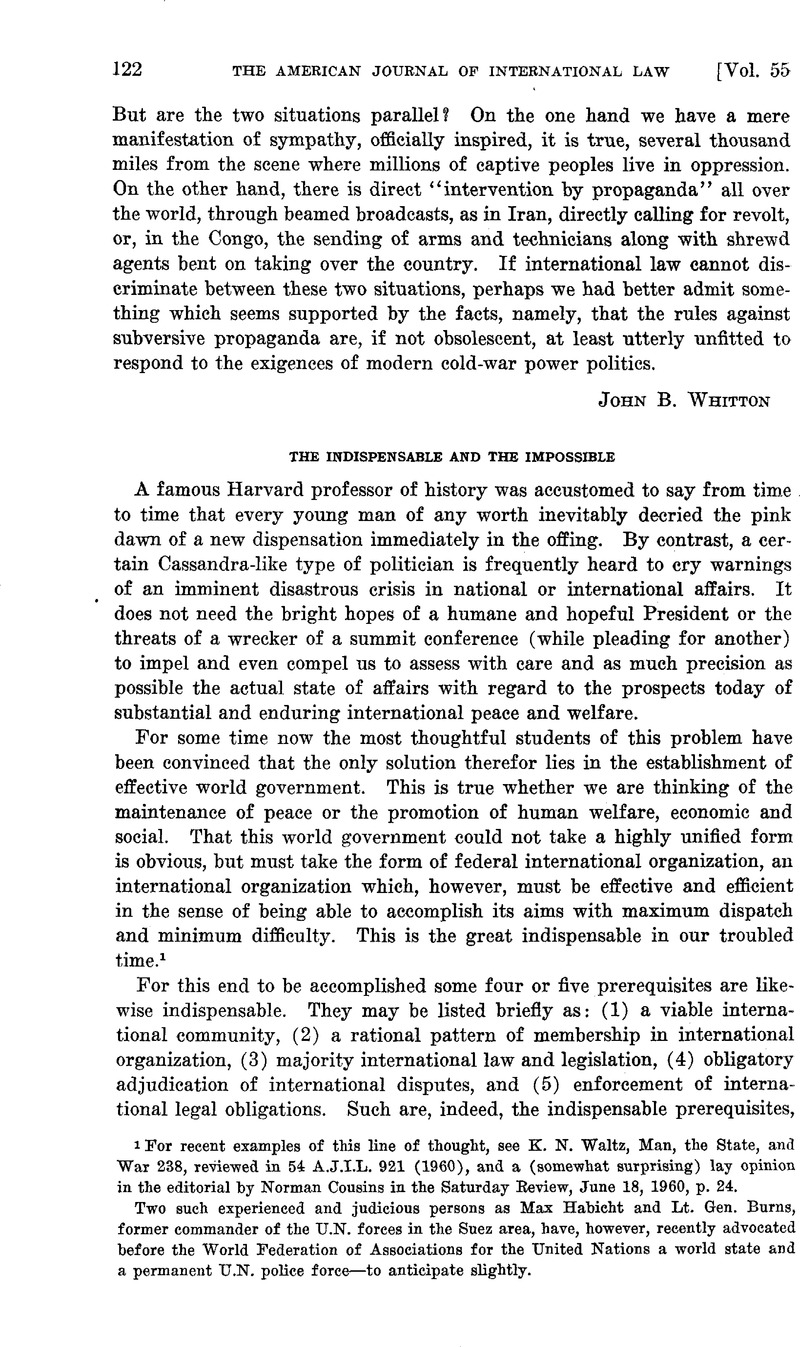No CrossRef data available.
Article contents
The Indispensable and the Impossible
Published online by Cambridge University Press: 28 March 2017
Abstract

- Type
- Editorial Comment
- Information
- Copyright
- Copyright © American Society of International Law 1961
References
1 For recent examples of this line of thought, see Waltz, K. N., Man, the State, and War 238, reviewed in 54 A.J.I.L. 921 (1960)Google Scholar, and a (somewhat surprising) lay opinion in the editorial by Norman Cousins in the Saturday Review, June 18, 1960, p. 24.
Two such experienced and judicious persons as Max Habicht and Lt. Gen. Burns, former commander of the U.N. forces in the Suez area, have, however, recently advocated before the World Federation of Associations for the United Nations a world state and a permanent U.N. police force—to anticipate slightly.
2 An interesting discussion of “the Commonwealth, ” à propos of the possible admission thereto of Cyprus, appeared in La Tribune de Genève, June 27, 1960, p. 18. For this purpose a general report of the Commonwealth Conference held in London in May would be most serviceable, but there is no such report available (intentionally).
3 A similar discussion of the French Community appeared in Le Journal de Genève, June 10, 1960, p. 1.
4 In both cases Continental observers have been predicting a similar explosion (éclatement).
5 It is true that from a practical point of view such blocs may be useful in managing the process of voting in international conferences, rather than to leave various individual states to try to make up their own minds on how to vote, but the result amounts nevertheless to a certain disruption and distortion of the composition of the international community. See Thomas Hovet, Jr., Bloc Politics in the United Nations (Cambridge, 1959) for extreme example.
6 For a recent discussion of voting in international organizations, see P. C. Jessup and H. J. Taubenfeld, Controls for Outer Space, Part I, and older but more extensive treatments in W. Koo, Voting Procedures in International Political Organizations, and C. O. Riches, Majority Rule in International Organization. Historically it was not demanded that common international law receive unanimous explicit consent in order to be valid, but any attempt at codification by convention inevitably poses the problem of unanimity versus majority rule.
7 The present state of affairs in this respect was recently summarized in a series of lectures at the Institut des Hautes Etudes Internationales in Geneva by Dr. Fritz Munch of the Berlin Section of the Max Planck Institute for International and Foreign Public Law. Le Journal de Genève, June 28, 1960, p. 3.
8 Hans Wehberg, Theory and Practice of International Policing, especially Ch. I.
9 That is, the necessity for definitive action overcomes the reluctance to submit to international authority, while the fear of the authority of reputed international law and/or the admitted binding force of international judicial settlements inhibits willingness to develop these institutions.
10 For a recent study of this problem of national and international federal union see Rice, W. G., Law Among States in Federacy, A Survey of Decisions of the Swiss Federal Tribunal in International Controversies, reviewed in 54 A.J.I.L. 922 (1960)Google Scholar.
11 Admission, that is, on the part of the wealthier states, victims of the application of the principle of ability to pay, of this necessity or fear of obloquy from the world at large, and recognition of the utter impracticality of applying either the principle of equality or that of benefits received, which is another testimony, incidentally, to the irrational character of the contemporary state system, though here not unlike the situation in the individual states.




